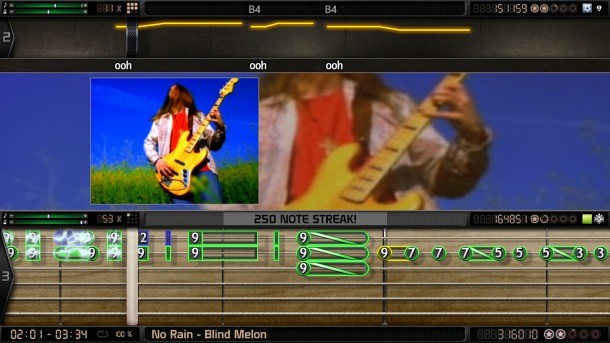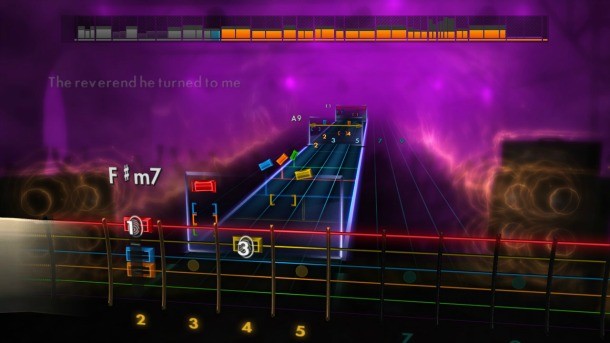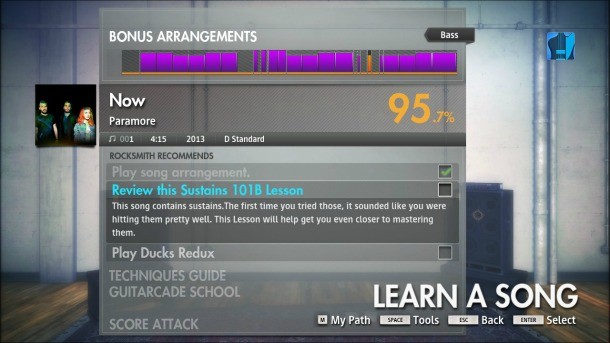Please support Game Informer. Print magazine subscriptions are less than $2 per issue
Which Guitar Game Should You Play?

We didn’t review two of this year’s music games, as both projects have moved from classic game experiences to something more akin to music education software. Nonetheless, both BandFuse: Rock Legends and Rocksmith 2014 are fascinating projects, especially if you’ve been excited about an opportunity to learn guitar through an interactive method. I spent several days playing both games, and found both excelled at different elements. There are things to like in both titles, but they're surprisingly different in their approach to play and teaching. Here’s a rundown of what I discovered, and what I liked or didn’t like in each guitar game.
Summary
BandFuse: Rock Legends feels most similar to existing music games like Rock Band and Guitar Hero, as the game encourages you to progress through a music tour, acquire fans and money, and select static difficulties before each song. As the subtitle implies, there’s a big focus on input from established rock musicians like Slash, Zakk Wylde, and Bootsy Collins. The game’s use of classic guitar tablature (TAB) in its presentation is its biggest plus, but a lack of guidance on how to progress holds the game back.
Rocksmith 2014 reinvents itself from its previous installment with a better front end, and an incredibly sophisticated dynamic learning system that responds to your growth in real time. This new version of Rocksmith has great production values, and a broad variety of ways to engage with the game to help maintain interest. It excels at step-by-step teaching, but stumbles through the use of a non-TAB notation system that takes a good while to grasp, and which won’t transfer well into subsequent growth as a guitarist.
Setup, Tuning, and Calibration
Winner: BandFuse: Rock Legends
Both games come with all the necessary cords and equipment needed to get going – you just need to bring a guitar with a 1/4 inch jack. And both games provide good documentation of how to set up with your audio system to best reduce lag. But the in-game system for tuning and calibration in BandFuse is better and more useable, with a simple system that got me in tune faster than in Rocksmith. Rocksmith’s tuner is okay, but it sometimes switches over to tuning the next string before you’re ready to move on, resulting in a previous string that is just slightly off. BandFuse also wisely defaults to a quick tune check-up before each song (which can be disabled in the Options), but keeping new players focused on the importance of staying properly tuned is smart.
Song Selection/Music Library
Winner: Tie
Both games feature an abundance of awesome rock music, and no one should have any compunction about engaging with the song list of either title. That said, BandFuse might have a slight edge in delivering some of the most iconic mainstream rock hits from across the ages, from Blue Öyster Cult and Foreigner to Maroon 5 and The Strokes. Many of these songs have shown up in previous music games, but here is a chance to learn them on a real guitar. Meanwhile, Rocksmith 2014 also offers some classics from the likes of KISS and Aerosmith, but delves into some deeper cuts with interesting song selections from artists like Deftones and Screaming Females. At the end of the day, both developers deserve credit for pulling together a great selection of songs.

BandFuse uses a variation on classic TAB notation to communicate what notes to play
Ease of Play and Interface
Winner: BandFuse: Rock Legends
BandFuse wins this category hands down through its implementation and use of classic guitar tablature (TAB) for its in-play interface. Anyone who has ever played even a little guitar has some experience reading TAB, and the real-time implementation of the system in BandFuse is spot-on. Moreover, when players move past the game into real life guitar playing, use of TAB ensures an easy transition. Meanwhile, Rocksmith creates an innovative but difficult-to-learn system that took me several practice sessions to understand and read – a strange amalgam of Guitar Hero-esque vertical scrolling notes with a color coding for the different strings. I was especially confounded by Rocksmith’s choice to put the bottom, bass E string at the top of the display interface, which is completely counter-intuitive to anyone who has ever read any form of musical notation. Thankfully, this strange choice can be inverted in the Options menu, but players should still expect to spend a chunk of time wrapping their brain around the way notes are displayed.

Rocksmith's in-song display is clean and pretty, but the notation system takes a while to learn
Production Values
Winner: Rocksmith 2014
From its menus and option systems to the ease of moving around between various pieces of content, Rocksmith looks and feels like a more polished and modern game. Once you get into a song, the text on screen is easy to read, and the visuals are inviting without being distracting. That’s not to say BandFuse is a slacker in its presentation, but the in-song music videos are sometimes surprisingly low-resolution, and some of the tutorial videos seem amateurish. It’s clear that Ubisoft’s long experience with game presentation pays off in this category.
Fun To Play
Winner: BandFuse: Rock Legends
I have to admit to being a little surprised by this, but as a player who came into these games with a little bit of guitar ability already under my belt, the somewhat ephemeral fun-factor goes to BandFuse. BandFuse takes cues from established music games like Rock Band by presenting the ongoing game as a tour where you acquire fans and money for good performances, and it’s fun to play a full concert of songs and hear the crowd getting excited. And perhaps it’s because of my aforementioned preference for TAB notation, but I found the song layouts in BandFuse on various difficulties to just be more engaging, and easier to connect with the music. With that said, Rocksmith is also great fun to play, and offers more ways to make progress beyond replaying the same song sections over and over.
[Next up: Which guitar game is a better learning tool?]

Rocksmith includes interactive learning minigames
Better Learning Tool
Winner: Rocksmith 2014
I struggled with exactly how to call this one, but it really comes down to the specifics of what you’re looking for. There’s no definitive answer, but Rocksmith has a slight edge. Bandfuse is less innovative in its teaching methods, but also falls back on some time-tested techniques that would serve a new guitarist well to practice, focusing on repetition, observing teachers who show you the basics, and presenting the long-standing TAB format that should transition well into song-learning outside of the game. However, Rocksmith offers a far more dynamic and customized experience for learning and growth. The “Rocksmith Recommends” system guides you to content across the game that matches the areas you’re failing at in-game. Plus, the in-song difficulty dynamically alters as you play well or poorly, so you’re constantly challenged.

BandFuse includes a four-player multiplayer mode
Multiplayer
Winner: BandFuse: Rock Legends
BandFuse allows up to four players to hop in together, presuming you have that many guitars, basses, and singers available. The karaoke options are fun for parties. Rocksmith only allows for two-player multiplayer, and isn’t really built for party play. Frankly, if you’re looking for a robust multiplayer experience that will be easy for players to jump into at a party, your best bet is to fall back on old standbys like Rock Band 3.
Styles of Play
Winner: Rocksmith 2014
Both BandFuse and Rocksmith allow players to learn both guitar and bass, but Rocksmith adds a little more subtlety by letting players choose between developing their lead guitar or rhythm guitar talents – two distinct skill sets that are based on different abilities and expertise. BandFuse addresses this in its own way, by integrating lead play with rhythm play, but I like being able to make that choice myself.

Rocksmith guides you to the content you need as you learn
Extras
Winner: Rocksmith
Between its guitarcade collection of minigames and its interactive lesson tools, Rocksmith pulls ahead to offer a more robust experience beyond the core song play. BandFuse presents a number of interesting short videos starring its titular rock legends, but these non-interactive features aren’t enough to balance the equation in an interactive medium. As you juggle what you’re looking for, I think it’s worth asking if you’re the kind of player who would want to engage with a lot of extras, or simply keep the focus on the the music – if you’re the latter, I wouldn’t factor this category into your final consideration.
Freeplay
Winner: Tie
Both games offer options to hop in and just jam, and they’re both fun in their own way. Before release, Rocksmith spent a lot of time touting the technological marvel of session mode, which lets you set various options for your band and musical scale, and then hop in and play with an artificially intelligent group of musicians who adapt to your playstyle. In practice, this system is interesting, but doesn’t always work as well as advertised. Even so, I like the ability you have to set your own options for the jam before you start. Bandfuse offers a jam option as well, but set to static audio backing tracks. In this case, that’s not always a bad thing – clear descriptions before you start each track tell you what the style of play is, and many of the subsequent jam tracks are engaging and enjoyable to play along with.
Conclusion
I was happily surprised by both Rocksmith 2014 and BandFuse: Rock Legends. While each has its own vision of providing entertainment and education, I’d be hard pressed to definitively call one or the other out as the best choice for every player. I plan to continue playing both in the coming months. Here’s hoping the best features from each game can find their way into a future guitar game installment.










